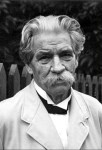 January 14th is the birthday of Albert Schweitzer (1875-1965), a gentle soul who blessed the world in countless ways, not only as a scholar and theologian, but also as a remarkable musician, organist, composer, and key organ conservationist during the 20th century. But even all of those talents would not be his greatest contribution to mankind.
January 14th is the birthday of Albert Schweitzer (1875-1965), a gentle soul who blessed the world in countless ways, not only as a scholar and theologian, but also as a remarkable musician, organist, composer, and key organ conservationist during the 20th century. But even all of those talents would not be his greatest contribution to mankind.

He was born in Alsace, during the time that this part of France was under German domination. Raised as a pastor’s son, he grew up in a rich theological and intellectual atmosphere. His father taught him piano at age five; by age nine, he was replacing the organist in his father’s church. Intently devoted to the work of Johann Sebastian Bach, his youthful dream was to study in Paris under the most famous organist of the day–Charles Louis Widor. At eighteen years of age, with much trepidation, he presented himself to Widor, who immediately recognized the genius of the young Alsatian lad and agreed to tutor him free of charge. One can only imagine the magnificence of sitting in Saint Suplice Cathedral in Paris, while these two remarkable musicians played with such reverence the inspiring works of Bach.
After completing his theological studies at the Sorbonne, Schweitzer was appointed to serve as curate in Strasbourg and it was here that his life mission changed dramatically. Always deeply burdened by the poor and suffering, Albert was struck with a deep conviction that the blessings he had received were gifts he must use in the service of others. He made a sacred vow that he would study until he was 30 and then devote the remainder of his life to serving those most in need. An article in the Paris Missionary Society magazine captured his attention at this time, opening his eyes to the desperate plight of the people of the Congo. Then and there he vowed that he would devote his life to these people and serve them in the name of Jesus.
Forsaking all his previous successes as theologian, philosopher, author, preacher, and musician, Schweitzer turned his back on all he loved so passionately, and headed back to the academy. In order to effectively serve the people of the Congo, he must have a medical degree! Six more years of study and Schweitzer was ready to begin his life’s mission.
Schweitzer served the people of the Congo for more than three decades. His time in Africa saw him often seeing hundreds of patients a day and in his first nine months there, he ministered to over 2000 patients. At Lambaréné, Schweitzer was doctor and surgeon in the hospital, pastor of a congregation, administrator of a village, superintendent of buildings and grounds, writer of scholarly works, commentator on contemporary history, musician, and gracious host to countless visitors. His work there earned him the Nobel Peace Prize in 1953, and countless other honors and distinctions. But what Schweitzer considered his most important legacy was his work on Reverence for Life.
 About twenty years-ago, I was first introduced to the life and work of Schweitzer through Hermann Hagedorn‘s wonderful biography, Prophet in the Wildernesss. And it was here I first read his amazing perspective on the value and dignity of human life. It isn’t surprising that against the backdrop of Hitler’s complete disregard for life, that Schweitzer was inspired to reinforce this most basic foundation of the Judeo-Christian ethic and to write so passionately about it. Here are just a few of his thoughts:
About twenty years-ago, I was first introduced to the life and work of Schweitzer through Hermann Hagedorn‘s wonderful biography, Prophet in the Wildernesss. And it was here I first read his amazing perspective on the value and dignity of human life. It isn’t surprising that against the backdrop of Hitler’s complete disregard for life, that Schweitzer was inspired to reinforce this most basic foundation of the Judeo-Christian ethic and to write so passionately about it. Here are just a few of his thoughts:
Reverence for Life! And after twenty-five hundred years, scarcely a handful really believing it! All the more reason to “stand and work in the world as one who aims at deepening men’s inner life and making them think.
In accordance with the responsibility of which I am conscious, I myself have to decide how much of my life, my possessions, my rights, my happiness, my time, and my rest I must devote to others, and how much of them I may keep for myself.
Christianity has need of thought in order to achieve understanding of its own real being. For centuries it treasured the great commandment of love and mercy as traditional truth without recognizing it as a reason for opposing slavery, witch-burning, torture, and so many other ancient and medieval atrocities. It was only when it experienced the influence of the thinking of the Age of Enlightenment that it was stirred into entering the struggle for humanity.”
 An old Landmark title, The Story of Albert Schweitzer by Anita Daniels, is a good introduction for children to one of the 20th century’s greatest heroes. Though out-of-print, it is worth searching out on used book sites. Take some time to learn about this hero of faith, this prophet of truth and goodness during a time when the death squads of Nazism held the reigns of power and authority. Schweitzer’s timeless message is as imperative in our day, as it was in his.
An old Landmark title, The Story of Albert Schweitzer by Anita Daniels, is a good introduction for children to one of the 20th century’s greatest heroes. Though out-of-print, it is worth searching out on used book sites. Take some time to learn about this hero of faith, this prophet of truth and goodness during a time when the death squads of Nazism held the reigns of power and authority. Schweitzer’s timeless message is as imperative in our day, as it was in his.



[…] Albert Schweitzer – Reverence for Life (reaberg.com) […]
Such a wonderful post on a great man. Thank you.
Thank you, Oonagh. He is one of my favorites. Have you read Prophet in the Wilderness by
Hagedorn? You’d love it!